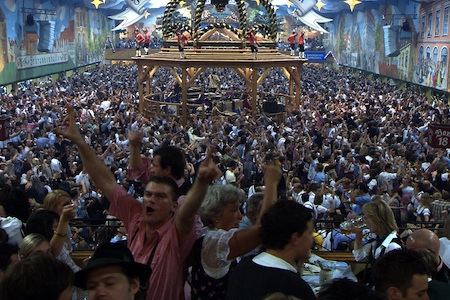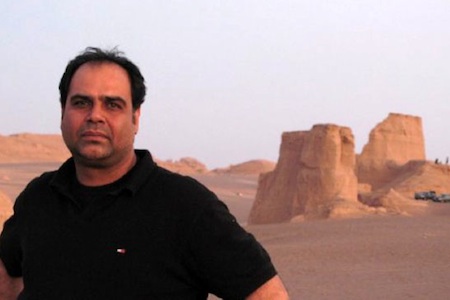We’re living through a golden age for documentaries, and that includes explicitly and implicitly political films. That said, the most popular documentary of any kind of 2012 was 2016: Obama’s America, a right-wing tirade from author Dinesh D’Souza. As critic Anthony Kaufman has suggested, its success may be a mirror image of the blockbuster status of Michael Moore’s Fahrenehit 9/11 during the Bush era. In order to click with a large audience, documentaries may have to be (or at least appear to be) oppositional. While many progressives have problems with the Obama administration, I’ve yet to see an entire film devoted to attacking it from the left.
A year ago, one might have expected definitive films about the Arab Spring and Occupy movement to have emerged. While Occupy has been the subject of enough films to fill small festivals, none of them have really crossed over into the documentary mainstream. Nor have any of the films made about the Arab Spring made much impact so far. This may change soon, as films about both movements are due to premiere at Sundance next month. But it may take time to get a real perspective on them. After all, it took decades for films like How to Survive a Plague and United in Anger to emerge about AIDS activism.
In compiling a list of the best political documentaries of 2012, I used a broad definition of “political.” Many people might not consider a film like The Queen of Versailles political, but without having an explicitly activist agenda, it reveals more about the consequences of America’s economic meltdown than many films that treat it more directly. Similarly, Searching For Sugar Man offers an antidote to the Forrest Gump version of the sixties. I chose films which adopt a wide range of formal techniques, from the deliberately disorienting The War, whose first two thirds are filled with unsubtitled Russian, to the fairly conventional The Central Park Five.
1. Abendland (Nikolaus Geyrhalter)
Politically suggestive but without a didactic message to impart, this Austrian film synthesizes of the cool gloss of Michael Haneke with the observational techniques of Frederick Wiseman. A status report on Western Europe’s soul, it shows immigrants working menial jobs and being deported while Europeans are busy calling suicide hotlines and keeping the Oktoberfest emergency room occupied.
2. All Watched Over by Machines of Loving Grace (Adam Curtis)
Made as a mini-series for the BBC, Curtis’s three-hour film has no U.S. distributor, but it made the festival circuit this year. Curtis proves himself to be a descendant of Chris Marker’s cinematic essays. Here, he explores the ways in which computer technology and ideologies ranging from Bill Clinton’s neoliberalism to Ayn Rand’s libertarianism have promised liberation but turned out to be traps.
3. This Is Not a Film (Jafar Panahi and Mojtaba Mirtahmasb)
When does a video diary become a political film? When the subject is under house arrest, banned from filmmaking (hence the ironic title) because the Iranian government feels threatened by his work. Under such circumstances, chronicling one’s everyday life, with humble tools (including an iPhone), becomes an act of resistance.
4. The War (James Benning)
A complete departure for Benning, this found-footage assemblage was made from clips taken by and of the Russian artist/activist group Voina. Without knowing Benning’s intentions, it appears to mix sympathy and critique, as Voina don’t come off too well—their actions, such as public masturbation in a supermarket and tipping over police cars, often seem either silly or dangerous. Nevertheless, The War conveys the real perils and bravery of activism in Russia.

5. How to Survive a Plague (David France)
Jean Cocteau once suggested that cinema was a form of death at work. France’s documentary about ACT-UP, taken mostly from archival footage shot by AIDS activists in the late eighties and early nineties, bears that out. In the wake of Occupy, it’s a reminder of the value of street-level activism. Its ending may be overly optimistic, given that millions of people still can’t afford medication to treat HIV, but who can blame the ACT-UP members whose lives were saved by protease inhibitors for their cheer?
6. Searching for Sugar Man (Malik Bendjelloul)
More than a simple, nostalgic music documentary, this is an optimistic story about the sixties counterculture. Its subject Rodriguez’s protest songs, inspired by a crumbling Detroit, helped influence white members of the South African antiapartheid movement. The musician himself is remarkably zen, far from a music industry casualty.
7. The Queen of Versailles (Lauren Greenfield)
Suggested alternate title: Laugh at the 1%. Greenfield’s film somehow manages to synthesize compassion and ridicule in its examination of the decline of a wealthy family. While it shows them wallowing cluelessly in privilege (by taking a limo to McDonald’s, for instance), it suggests that losing your home is a horrible trial, whether you owe millions or thousands. Unlike the reality TV shows it superficially resembles, The Queen Of Versailles never glamorizes its subjects, but its critical gaze is fair.
8. The Law in these Parts (Ra’anan Alexandrowicz)
Interviewing Israeli judges on a stylized set, Alexandrowicz examines how the notion of Israel’s right to defend itself after occupying the Gaza Strip and West Bank in 1967 led to ludicrous miscarriages of justice like a Palestinian woman being sentenced to prison for giving bread to a “terrorist.” His film resembles Errol Morris’ The Fog of War, with the crucial difference that Alexandrowicz is a tough, adversarial interviewer.
9. The Central Park Five (Ken Burns, Sarah Burns and David McMahon)
Working outside PBS and collaborating with two other directors, Ken Burns thankfully abandons his now-cliched trademarks like zooms into photos. The Central Park Five resurrects the paranoid atmosphere of late ‘80s New York, where five teenage boys were falsely convicted of raping a jogger in Central Park. Its strongest moments are videotaped false confessions, but it also ably evokes the hysterical, racist tabloid media that’s still with us.
10. The Invisible War (Kirby Dick)
An anti-recruitment film par excellence, The Invisible War gives a voice to male and female soldiers who’ve been raped and then been ignored by military leadership. While it never examines the issue in a larger context, such as the way rape has often been used in war to punish enemies, it’s the only film on this list, as far as I know, that’s had a concrete influence on policy.




